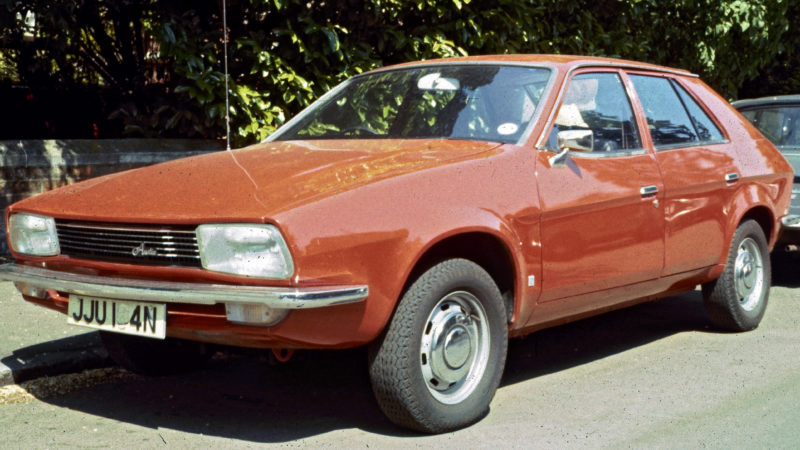21st-century public services must be responsive and democratic. We have to look at new ways to 'take back control'.

Pic: A British Leyland (Austin) car from the 1970s.
It is a mark of how far the debate has come that when Labour announced yesterday plans to take water, energy, rail and the Royal Mail back into public ownership, the howls of protest were surprisingly muted. Or at least, you could keep a conversation going on over them.
Part of this is Labour setting the agenda, and shifting the narrative on all issues. But another key part is that the old assumption that nationalisation means pure state control, like British Leyland in the 1970s, no longer holds. No one is calling for a huge, unresponsive, identikit version of British Rail.
Across the left, there is an acceptance that ‘nationalisation’ must actually mean something quite different to its old meaning. Thankfully, in a shrewd messaging move, Labour’s June manifesto made no mention of it.
Instead, we have to talk about real democratic ownership.
There are many ways of doing that. There is co-operatisation – turning private bodies into co-ops. Previous plans for bringing rail into public ownership suggested having a ‘thirds’ set-up: one third government-owned, one third worker-owned, and one-third passenger-owned. Indeed, Green MP Caroline Lucas has proposed plans along these lines in Parliament.
You can set up not-for-profits which are run by all stakeholders: indeed, Wales, Northern Ireland and Scotland’s water sectors are all mostly run by publicly-owned or not-for-profit organisations – to keep the sharks out of the water system.
And there is local ownership. the Transnational Institute has outlined ‘at least 835 examples of (re)municipalisation of public services worldwide since 2000, involving more than 1,600 municipalities in 45 countries’ – that means taking services back into local control – and bringing their operation closer to the people.
Today, Corbyn outlined his vision for real democracy in public services:
I promised you two years ago that we would do politics differently. It’s not always been easy. There’s quite a few who prefer politics the old way. But let me say it again. We will do politics differently. And the vital word there is “we”.
Not just leaders saying things are different in a way that leaves everything the same – but everyone having the chance to shape our democracy. Our rights as citizens are as important as our rights as consumers. Power will be devolved to the community, not monopolised in Westminster and Whitehall.
Now let’s take it a stage further: make public services accountable to communities, business accountable to the public and politicians accountable to those we serve.
Let the next Labour government transform Britain by genuinely placing power in the hands of the people – the creative, compassionate and committed people of our country.
(From the Mirror’s feed)
Cat Hobbs, Director of the WeOwnIt, the campaign group for public ownership, told Left Foot Forward:
“There is huge public support for ending the failures of privatisation in energy, water and rail. Instead of wasting money on shareholders, we can reinvest the profits and build public services that work for all of us.
“Public ownership is needed at all levels – local, regional and national, with real accountability and democracy. It’s about all of us owning the services we use and pay for.”
There will be some work to put meat on the bones, but 21st century services must be responsive and democratic. Gone are the days of top-down bureaucratic control. Thankfully, the left now recognise that.
Josiah Mortimer is Editor of Left Foot Forward. Follow him on Twitter.
Left Foot Forward doesn't have the backing of big business or billionaires. We rely on the kind and generous support of ordinary people like you.
You can support hard-hitting journalism that holds the right to account, provides a forum for debate among progressives, and covers the stories the rest of the media ignore. Donate today.




4 Responses to “There can be no return to old-style nationalisation – thankfully the left is moving on”
Dulari-Leiylah Markelke
Corbyn speech understanding of transformation is for the many not the old style a style for today. Its us that need labour under corbyn not the other way round and this needs to be remembered. Today his speech is a human for our broken country
MJW
The sentiments are all very well and good, but when push comes to shove would a left-wing Labour government really resist propping up inefficient or unproductive nationalised industries with taxpayer cash? Unions fund the Labour party, and to unions, unproductive or inefficient work is still someone’s job, and their role as a union is to protect their members jobs, even when they are inefficient and unproductive.
Simon Radford
Good post. I wish the language was updated too, so that people other than those well-informed enough to read this blog would realise that this is not a 70s throwback, as it sounds to most.
Dave Roberts
Austin Princess. I bought one new in 1978. It was crap like all of British Leyland’s products run by Tony Ben and the unions. Been there, done that.